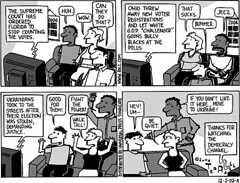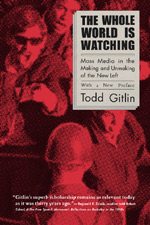Protest as Civic Engagement and the role of the media
Last week, I had an entry about FCC proposals allowing a much greater concentration within media markets. Lynda writes:
The FCC is preparing to pass new rules on media ownership and is pushing legislation that would allow big media companies to have cross-ownership of major newspapers and TV stations in a single media market, and allow other changes to reduce diversity on the radio dial.
The Federal Communications Commission is holding its last public hearing about this in DC on Wednesday.
This meeting was announced last minute, probably to deter public out cry, and I am helping from friends at Prometheus Radio Project and Free Press spread the word about this meeting and to encourage folks to attend the rally on Wednesday. There is more information about the rally below as well as information about the state of DC media.
Rally for Better Media in DC – This Wednesday – Spread the Word
The Federal Communications Commission is holding a "public" hearing in Washington on how much of the local media one company should own.
Haven't heard about it? That's because the FCC — and its Big Media allies — are hoping you won't show up. Help us spread the word. We are holding a rally outside the FCC to be sure that local communities have a voice at this event…
Rally for a Better Media
Wednesday, Oct. 31, 9am
Outside the FCC, 445 12th Street SW
Washington , D.C. ( map)
Visit www.stopbigmedi.com/=dc for more information or download, a poster here
Announcing the hearing at the last minute is just another way that the FCC has tried to push the public out of the process. At each of the previous hearings, the public spoke out overwhelmingly against media consolidation. And now it seems that FCC Chairman Kevin Martin has heard enough.
He may not want to listen to the countless Americans who are sick and tired of a broken media system -- but they will be heard.
Hearing details:
Official FCC Localism Hearing
Oct. 31, 2007, 9 a.m. to 2 p.m.
Room TW-C305 following open commission meeting
FCC, 445 12th Street SW , Washington , D.C. 20554 ( map)
Get the Facts About Media in DC
Media ownership in Washington DC doesn't reflect the diversity of its population and media outlets don't serve local communities. People of color comprise 72 percent of the population in the city of Washington , 40 percent of the population in the Washington TV market, and 46 percent of population in the Washington radio market. However, only 26 percent of the area's commercial full-power broadcast radio and television stations are owned by people of color.
Women make up over half of Washington 's population, but own just one of the market's full-power commercial broadcast stations. Only seven of Washington 's 44 commercial radio stations have female general managers, and there are no female general managers at any of Washington 's full-power commercial TV stations. FCC deregulation would devastate the area's few independent voices. If the FCC further relaxed its ownership rules even further it would devastate diverse, local voices in Washington DC .
Visit www.stopbigmedi.com/=dc for more information
----------------------------------------------------------------------------------This is reprinted from September 2006.
Note that Provisions Library no longer has regular hours. And the DC Independent Media Center no longer has a "bricks and mortar" location. Note that in the context of library planning for the city, I suggested that somehow maybe it could be worked out to co-locate Provisions Library, the Foundation Center Library, and even the DC Independent Media Center within an expanded Central Library.
---------------------------------------
Somehow I missed this comment in a Post editorial about Thailand, but eagle-eyed Post reader Manuel Briskin of Arlington caught it, and brings it to our attention via a letter to the editor in today's Post, "Voting With Their Feet":
The Sept. 21 editorial "Thailand's Leap Backward" said that political parties have been trying to force Thai Prime Minister Thaksin Shinawatra "from power through such undemocratic means as street demonstrations."
Haven't you heard of freedom of speech and freedom of assembly? And how did you feel about the street demonstrations that took place during Ukraine's Orange Revolution, elsewhere in the former Soviet bloc and in Tiananmen Square? Peaceful street demonstrations are not undemocratic.
But in this country they are too rarely covered. And too much effort is put into delegitimizing protest.

Ted Rall editorial cartoon, 12/2/2004.
The fact is, newspapers, being part of the growth machine and supporters of the general political economy and society, aren't so big on challenging the status quo.
In the earlier piece, I don't think I mentioned Todd Gitlin's book, The Whole World is Watching, which is another of the books that has had tremendous impact on the way I view the world, especially media.

In the early 1960s, Gitlin was president of Students for a Democratic Society, a foundational organization of the student movement of the 1960s. This book is an expansion of Gitlin's dissertation, which analyzes how the New York Times and CBS News covered SDS, and how this impacted external perceptions of the movement, as well as how the organization was impacted internally, because of press coverage.
Another book I haven't really read, but should, is Making Local News by Phyllis Kaniss. From the description:
Why do crimes and accidents earn more news coverage than development and policy issues affecting thousands of people? Filled with revealing interviews with both journalists and city officials, Making Local News is the first comprehensive look at how the economic motives of media owners, professional motives of journalists, and the strategies of media-wise politicians shape the news we see and hear, thereby influencing urban policy.
And the Express ran an AP article today, "Pirate Radio Stations Challenge Feds," on the pirate form of community radio. Do you know that there is a community radio station in Mount Pleasant that is derived from this broad movement?
Similarly to how the press focuses on big institutions, radio and the broadcasting industry was originally a much more democratic and community-involved media (other than the RCA and newspaper-owned stations of the time). Robert W. McChesney has written many books about this. From the Wikipedia entry on Professor McChesney:
McChesney sees the Communications Act of 1934 as essentially allowing monopolistic rights to broadcasters who had shown the greatest propensity for profit. Subsequent to this act were the provisions of the Fairness Doctrine, which had provisions for public interest broadcasting due to the scarcity of the broadcasting resource. These restrictions were later overturned in the 1980's under the banner of "deregulation."
Two other local "independent media" resources are:
-- Provisions Library
-- DC Independent Media Center.
Then there are incredible learning opportunities and the ability to broadcast via DCTV (Public Access Cable). Plus the ability to listen to a wider variety of perspectives on the Pacifica Radio Station WPFW-FM Radio. And just making stuff available on the DC Government Cable Television Channels 13 and 16, showing Council Hearings and like says something.
Maybe the "revolution will not be televised" but information is out there. Plus the Internet of course.
--------
But Marc Fisher has at least 700,000 more readers than yours truly...
Labels: civic engagement, media, protest



0 Comments:
Post a Comment
<< Home